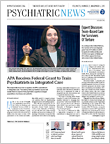There does not appear to be any significant association between a history of childhood adversity and the course of psychotic illness during the first year after presentation to mental health services, according to a report published online in Schizophrenia Bulletin.
However, childhood adversity was associated with several outcomes that the authors of the study suggest could impact service use and social functioning among psychosis patients.
Researchers at King’s College London investigated associations between childhood adversity and one-year outcomes in 285 first-presentation psychosis patients. Exposure to childhood adversity prior to 17 years of age was assessed using the Childhood Experience of Care and Abuse Questionnaire. Data on illness course, symptom remission, length of psychiatric hospitalization, compliance with medication, employment, and relationship status were extracted from clinical records for the year following first contact with mental health services for psychosis.
The sample was drawn from patients who participated in the Genetics and Psychosis Biomedical Research Centre (GAP-BRC) study from the Lambeth, Southwark, Lewisham, and Croydon adult inpatient and outpatient units of the South London and Maudsley Mental Health NHS Foundation Trust.
A total of 71 percent of patients reported exposure to at least one type of childhood adversity (physical abuse, sexual abuse, parental separation, parental death, disrupted family arrangements, or being taken into care). Despite the high prevalence of childhood adversity in the sample of patients, the researchers found no evidence that a history of adversity impacted either remission from psychotic symptoms or global functioning scores at one-year follow-up. There was no robust evidence of a dose-response effect for exposure to multiple adverse experiences on clinical course of psychosis, symptomatic remission, or global clinical functioning over one-year follow-up.
However, psychosis patients who reported a history of physical abuse were almost three times more likely to be single at follow-up compared with patients who did not report this type of adversity. Moreover, there was evidence of an association between parental separation in childhood and a longer admission to a psychiatric ward during one-year follow-up, with cases reporting such adversity being approximately twice as likely to have longer hospital stays compared with those without such a history. Psychosis patients reporting a history of parental separation were also more likely to be noncompliant with medications one year after first contact with psychiatric services compared with those who did not have this experience.
The authors noted that previous studies have shown that patients with psychosis who reported a history of childhood abuse are more likely to avoid intimacy.
“Given the high prevalence of childhood adversities reported by first-presentation psychosis cases in this sample, routine assessment of adversity history and psychotherapies focused on adverse childhood experiences should be considered by services providing treatment to psychosis patients,” the researchers wrote. ■
“Impact of Different Childhood Adversities on 1-Year Outcomes of Psychotic Disorder in the Genetics and Psychosis Study” can be accessed
here.
